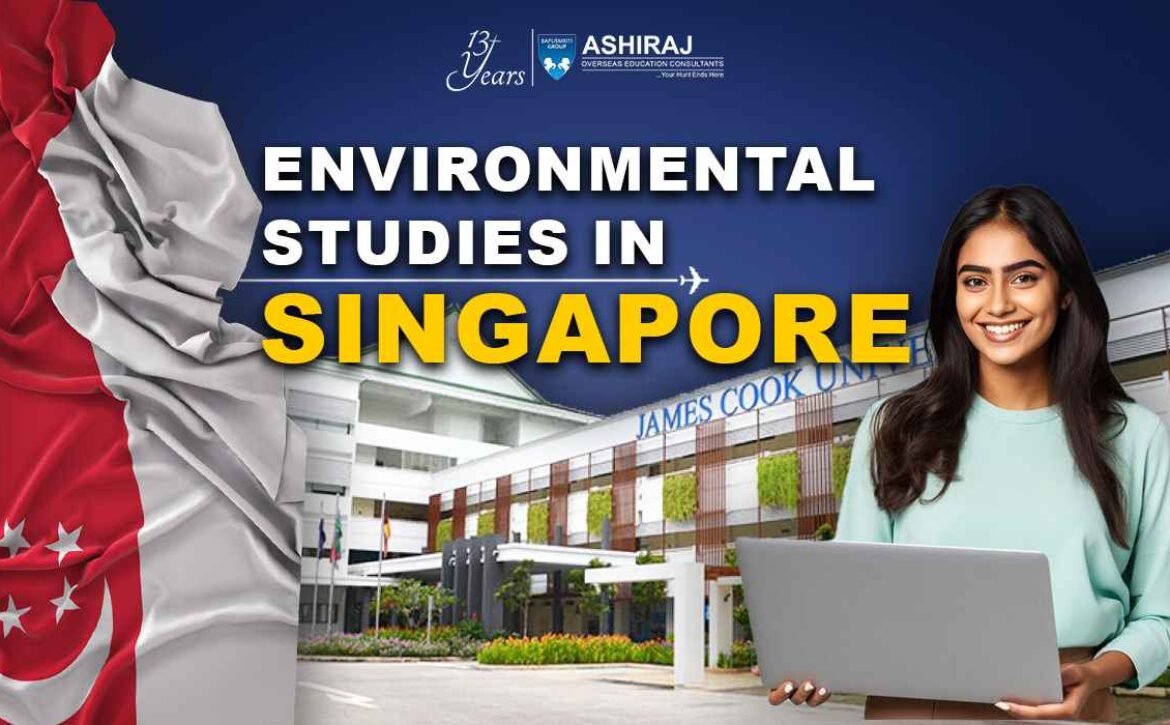
Environmental Studies in Singapore
Environmental studies in Singapore encompass a dynamic field focused on the nation’s sustainable development and environmental conservation efforts. As a global hub of commerce and innovation in Southeast Asia, Singapore places significant emphasis on environmental sustainability to balance rapid urbanization with ecological preservation. This discipline explores various aspects such as biodiversity conservation, climate change resilience, urban planning, and green technology adoption. Singapore’s proactive approach includes stringent environmental policies, extensive green spaces like the Singapore Botanic Gardens and Pulau Ubin, and pioneering initiatives such as the Marina Barrage for water management and Gardens by the Bay for urban greening. These efforts reflect Singapore’s commitment to fostering a green economy while addressing environmental challenges through research, education, and innovative solutions.
Environmental studies in Singapore not only address local environmental issues but also contribute to global environmental discourse through collaborations, research partnerships, and international conferences. The integration of environmental sustainability into Singapore’s national identity underscores its dedication to achieving harmony between economic growth and environmental stewardship. Through a multidisciplinary approach that combines science, policy, and community engagement, Singapore continues to lead by example in sustainable development practices, influencing regional and global environmental agendas positively.
Why to Study Environmental Studies in Singapore?
- Global Hub for Sustainability: Singapore is a leading global example in integrating environmental sustainability into urban development and policy.
- Cutting-Edge Research Opportunities: Study programs offer access to state-of-the-art research facilities and collaborations with renowned institutions.
- Practical Learning Initiatives: From the Marina Barrage to Gardens by the Bay, students engage in real-world case studies of sustainable urban planning and ecosystem conservation.
- Multicultural Exposure: Singapore’s diverse population and international student community provide rich cultural exchanges and perspectives on global environmental challenges.
- Career Opportunities: Graduates are well-positioned for careers in environmental consultancy, government agencies, NGOs, and green technology sectors.
- Strong Government Support: Singapore’s proactive environmental policies create a conducive environment for studying and implementing sustainable practices.
- Networking and Collaboration: Opportunities to network with industry leaders and participate in international conferences and workshops.
- Focus on Innovation: Emphasis on green technology and innovation fosters creativity and entrepreneurship in sustainable solutions.
- Quality Education: Institutions like the National University of Singapore (NUS) and Nanyang Technological University (NTU) offer top-tier environmental studies programs.
- Personal Growth: Studying in Singapore cultivates critical thinking, problem-solving skills, and a global perspective crucial for tackling environmental issues worldwide.
Top Universities to Study Environmental Studies in Singapore
Rank | University | QS World University Ranking 2023 | Type of University | Average Annual Fees | Programs Offered |
1 | National University of Singapore (NUS) | 11 | Public | SGD 28,000 | Environmental Science, Environmental Engineering, Ecology |
2 | Nanyang Technological University (NTU) | 12 | Public | SGD 25,000 | Environmental Studies, Sustainable Development, Climate Change |
3 | Singapore Management University (SMU) | 511-520 | Private | SGD 32,000 | Environmental Economics, Policy and Sustainability |
4 | Singapore University of Social Sciences (SUSS) | 551-560 | Public | SGD 20,000 | Environmental Management, Sustainable Business |
5 | Yale-NUS College | 151-200 | Private | SGD 34,000 | Environmental Studies, Urban Ecology, Conservation Biology |
These top universities in Singapore offer robust programs in environmental studies, preparing students with both theoretical knowledge and practical skills necessary for addressing global environmental challenges. The National University of Singapore (NUS) and Nanyang Technological University (NTU) lead the rankings, providing a range of specialized courses from environmental science to sustainable development. Singapore Management University (SMU) and Singapore University of Social Sciences (SUSS) cater to students interested in environmental economics, policy, and management. Yale-NUS College, known for its interdisciplinary approach, offers unique programs in environmental studies and urban ecology. With varying tuition fees and types of universities—public and private—students can choose institutions that best align with their academic and career goals in environmental studies in Singapore.
Course Curriculum for Environmental Studies in Singapore
- Core Disciplines: Environmental studies in Singapore cover core subjects such as ecology, environmental science, and sustainable development.
- Interdisciplinary Approach: Courses integrate disciplines like biology, chemistry, geography, and economics to understand complex environmental issues.
- Policy and Governance: Emphasis on environmental policies, governance frameworks, and international agreements like the Paris Agreement.
- Fieldwork and Practical Experience: Opportunities for fieldwork in Singapore’s diverse ecosystems and urban environments enhance practical learning.
- Technology and Innovation: Focus on green technologies, renewable energy, and sustainable urban planning strategies.
- Global Perspectives: Comparative studies with global environmental challenges and solutions broaden students’ perspectives.
- Research Opportunities: Access to research projects addressing local and regional environmental issues.
- Community Engagement: Involvement in community-based initiatives and partnerships with NGOs and government agencies.
- Career Preparation: Courses prepare graduates for careers in environmental consultancy, policy-making, research, and advocacy.
- Adaptation and Resilience: Strategies to address climate change impacts and build resilience in ecosystems and communities.
Environmental studies in Singapore offer a comprehensive curriculum that equips students with the knowledge and skills to contribute effectively to sustainable development and environmental conservation locally and globally.
Eligibility Criteria & Admission Requirements for MS in Environmental Studies in Singapore
- Academic Qualifications:
– Applicants typically need a bachelor’s degree in relevant fields like environmental science, biology, geography, or related disciplines.
- English Language Proficiency:
IELTS: Minimum score of 6.5 overall, with no less than 6.0 in each section.
TOEFL: Minimum score of 90 overall, with a minimum of 20 in each section.
- Standardized Tests:
GRE: Some programs may require a GRE score. The typical range varies by institution.
GMAT: Some business-oriented environmental programs may require a GMAT score. Scores vary by program.
- Documentation:
Passport & Student Visa: Valid passport and student visa for the duration of study in Singapore.
Academic Certificates: Certified copies of academic transcripts and certificates from previous institutions.
Work Experience: Relevant work experience, if required or beneficial for specific programs.
Scores for Standardized Tests
Test | Minimum Score |
IELTS | Overall 6.5, with no less than 6.0 in each section |
TOEFL | Overall 90, with at least 20 in each section |
GRE | Scores vary by program |
GMAT | Scores vary by program |
These eligibility criteria ensure that applicants for environmental studies programs in Singapore have the necessary academic background, language proficiency, and documentation to pursue their studies effectively. Meeting these requirements prepares students to engage meaningfully in coursework, research, and practical applications related to environmental sustainability in Singapore and beyond.
Documents Required for Studying Environmental Studies in Singapore
- Passport: Valid passport with a minimum validity period as required by Singaporean authorities.
- Letters of Recommendation (LOR): Typically, two letters from academic or professional referees endorsing the applicant’s suitability for the program.
- Statement of Purpose (SOP): A concise essay outlining the applicant’s academic background, career goals, and reasons for choosing environmental studies in Singapore.
- Curriculum Vitae (CV): A detailed resume highlighting academic achievements, relevant work experience, and extracurricular activities.
- Official High School Transcripts and Certificates: Certified copies of transcripts and certificates from high school or equivalent education.
- Work Experience Certificate: If applicable, a document verifying relevant professional experience in the field.
- Proof of Financial Resources: Evidence such as bank statements or sponsorship letters demonstrating sufficient funds to cover tuition fees and living expenses in Singapore.
These documents are crucial for the application process and visa requirements for environmental studies programs in Singapore. They provide admissions committees and immigration authorities with a comprehensive view of the applicant’s qualifications, motivations, and financial readiness to pursue higher education in the country. Meeting these requirements ensures a smooth application process and enables prospective students to focus on their academic and career aspirations in environmental studies.
Admission Process for Environmental Studies in Singapore
- Research and Choose Programs: Explore environmental studies programs offered by universities in Singapore, considering curriculum, faculty expertise, and research opportunities.
- Check Eligibility Requirements: Review specific admission criteria such as academic qualifications, standardized test scores (IELTS/TOEFL, GRE/GMAT), and language proficiency.
- Prepare Required Documents: Gather essential documents including transcripts, letters of recommendation (LOR), statement of purpose (SOP), CV, and proof of financial resources.
- Submit Online Application: Complete the university’s online application form and upload all required documents according to the specified deadlines.
- Pay Application Fee: Pay the application fee as required by the university or program.
- Await Admission Decision: Universities will review applications and notify applicants of their admission status. This process may take several weeks.
- Acceptance and Visa Application: Upon receiving an offer of admission, accept the offer and proceed to apply for a student visa (if applicable).
- Enrollment and Orientation: Once the visa is approved, enroll in the program and attend orientation sessions to familiarize yourself with the university and its resources.
- Commence Studies: Begin your environmental studies journey in Singapore, engaging in coursework, research, and practical learning experiences.
Following these steps ensures a systematic approach to securing admission to environmental studies programs in Singapore, facilitating a smooth transition into higher education in this dynamic field.
“Education is the most powerful weapon which you can use to change the world.”
Nelson Mandela
Cost of Environmental Studies Course in Singapore
- Tuition Fees: Average annual tuition fees range from SGD 20,000 to SGD 35,000 depending on the university and program.
- Living Expenses: Estimated living costs, including accommodation, meals, transport, and miscellaneous expenses, are approximately SGD 12,000 to SGD 20,000 per year.
- Books and Supplies: Additional costs for textbooks, study materials, and equipment may amount to SGD 1,000 to SGD 3,000 annually.
- Health Insurance: Mandatory health insurance for international students typically costs around SGD 500 to SGD 1,500 per year.
- Miscellaneous Fees: Includes application fees, student union fees, and other administrative charges, totalling about SGD 500 to SGD 2,000 per year.
- Scholarships and Financial Aid: Opportunities for scholarships, grants, and bursaries offered by universities, government, and private organizations can help offset expenses.
- Part-Time Work: International students can work part-time during term breaks or up to 16 hours per week during term time to supplement income.
Understanding these costs helps prospective students budget effectively and plan for their financial obligations while pursuing environmental studies in Singapore. It’s advisable to research specific university fees and living costs to create a comprehensive financial plan for the duration of study.
Scholarships for Environmental Studies Courses in Singapore
Scholarship Name | Amount | Application Deadline |
Singapore International Graduate Award (SINGA) | Full tuition fees, monthly stipend of SGD 2,000, and other allowances | December 1 (annually) |
ASEAN Undergraduate Scholarship (AUS) | Full tuition fees, monthly stipend, and accommodation allowance | Varies by university |
NUS Graduate School Scholarship for ASEAN Nationals | Full tuition fees and monthly stipend | Varies by program |
NTU Nanyang President’s Graduate Scholarship | Full or partial tuition fees and monthly stipend | December 31 (annually) |
SMU Global Impact Scholarship | Up to SGD 60,000 per year | March 31 (annually) |
These scholarships provide financial support for international and domestic students pursuing environmental studies in Singapore. Each scholarship has specific eligibility criteria, including academic merit, leadership qualities, and commitment to environmental sustainability. Application deadlines vary by scholarship and are typically announced well in advance, allowing students ample time to prepare and submit their applications. Securing a scholarship not only helps alleviate tuition costs but also enhances opportunities for academic and professional growth in the field of environmental studies in Singapore.
Career Opportunities After Environmental Studies in Singapore
Job Profile | Average Salary (SGD per year) |
Environmental Consultant | 50,000 – 80,000 |
Sustainability Manager | 60,000 – 100,000 |
Environmental Engineer | 55,000 – 90,000 |
Climate Change Analyst | 50,000 – 85,000 |
Urban Planner | 60,000 – 95,000 |
Environmental studies graduates in Singapore have diverse career opportunities in sectors such as consulting firms, government agencies, non-profit organizations, and private companies. Roles like environmental consultants involve advising clients on environmental impact assessments and sustainability practices. Sustainability managers oversee corporate environmental strategies to ensure compliance with regulations and enhance green initiatives. Environmental engineers design and implement solutions for pollution control and waste management. Climate change analysts assess climate risks and develop adaptation strategies. Urban planners focus on sustainable urban development and infrastructure projects. Salaries vary based on experience, qualifications, and the specific employer. Pursuing a career in environmental studies in Singapore not only offers competitive salaries but also contributes to global efforts in environmental conservation and sustainability.
Frequently Asked Questions About Environmental Studies in Singapore
Environmental studies graduates in Singapore can pursue careers as environmental consultants, sustainability managers, environmental engineers, climate change analysts, and urban planners, among others.
Yes, there are several scholarships available, such as the Singapore International Graduate Award (SINGA), ASEAN Undergraduate Scholarship (AUS), and various university-specific scholarships.
Eligibility typically includes a relevant bachelor’s degree, English language proficiency (IELTS/TOEFL), and possibly standardized test scores like GRE/GMAT for some programs.
The average annual tuition fees range from SGD 20,000 to SGD 35,000, and living expenses including accommodation and food range from SGD 12,000 to SGD 20,000 per year.
The top universities include the National University of Singapore (NUS), Nanyang Technological University (NTU), Singapore Management University (SMU), Singapore University of Social Sciences (SUSS), and Yale-NUS College.
International students must apply for a student pass through the Immigration and Checkpoints Authority (ICA) of Singapore after receiving an acceptance letter from a recognized educational institution.
Students have access to research projects addressing local and global environmental challenges, often collaborating with industry and government agencies.
Yes, international students can work part-time up to 16 hours per week during term time and full-time during vacations, subject to approval from the Ministry of Manpower.
Admission deadlines vary by university and program, but they usually fall between December to March for most programs starting in the following academic year.
Universities often assist students in finding suitable accommodation either on campus or in nearby areas. Additionally, private rental options are available throughout Singapore.




